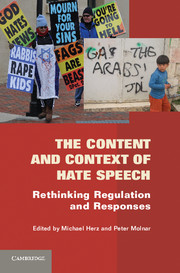Book contents
- Frontmatter
- Contents
- Contributors
- Foreword: Hate Speech and the Coming Death of the International Standard before It Was Born (Complaints of a Watchdog)
- Foreword: Hate Speech and Common Sense
- Acknowledgments
- Introduction
- Part I Overviews
- Part II Refinements and Distinctions
- 7 Social Epistemology, Holocaust Denial, and the Post-Millian Calculus
- 8 Denying Experience
- 9 What's Wrong with Defamation of Religion?
- 10 Responding to “Hate Speech” with Art, Education, and the Imminent Danger Test
- 11 Reconceptualizing Counterspeech in Hate Speech Policy (with a Focus on Australia)
- 12 Hate Speech and Self-Restraint
- 13 Hate Speech in Constitutional Jurisprudence
- 14 One Step Beyond Hate Speech
- 15 Hate Speech and Comprehensive Forms of Life
- Part III Equality and Fear
- Part IV International Law
- Index
- References
7 - Social Epistemology, Holocaust Denial, and the Post-Millian Calculus
Published online by Cambridge University Press: 05 June 2012
- Frontmatter
- Contents
- Contributors
- Foreword: Hate Speech and the Coming Death of the International Standard before It Was Born (Complaints of a Watchdog)
- Foreword: Hate Speech and Common Sense
- Acknowledgments
- Introduction
- Part I Overviews
- Part II Refinements and Distinctions
- 7 Social Epistemology, Holocaust Denial, and the Post-Millian Calculus
- 8 Denying Experience
- 9 What's Wrong with Defamation of Religion?
- 10 Responding to “Hate Speech” with Art, Education, and the Imminent Danger Test
- 11 Reconceptualizing Counterspeech in Hate Speech Policy (with a Focus on Australia)
- 12 Hate Speech and Self-Restraint
- 13 Hate Speech in Constitutional Jurisprudence
- 14 One Step Beyond Hate Speech
- 15 Hate Speech and Comprehensive Forms of Life
- Part III Equality and Fear
- Part IV International Law
- Index
- References
Summary
It is no longer news that there are countries in which it is unlawful to deny the existence of the Nazi Holocaust. Nor is it surprising that among these countries are Austria, Germany, and Israel, given the obvious historical reasons for their treatment of Holocaust denial with special sensitivity. But Holocaust denial is also a crime in Belgium, Canada, France, Spain, and Switzerland, among other countries, and a similar prohibition is now being proposed in Argentina. Moreover, existing or proposed laws also deal with denial of genocide in, for example, Armenia and Rwanda, and thus it is safe to say that the question of legal prohibitions on Holocaust denial is one of worldwide and not just regional or local interest.
Although the criminalization of Holocaust denial is thus hardly unique, it is also the case that in other countries, most obviously, but not only, the United States, the very idea of punishing the expression of an idea on account of the idea's falsity goes to the heart of principle of freedom of speech. It is not simply that Holocaust denial is legally permitted and constitutionally protected in the United States. It is that the legal and constitutional permissibility of Holocaust denial is understood as a core and not merely a fringe application of the very idea of freedom of speech under the First Amendment.
- Type
- Chapter
- Information
- The Content and Context of Hate SpeechRethinking Regulation and Responses, pp. 129 - 143Publisher: Cambridge University PressPrint publication year: 2012
References
- 12
- Cited by



